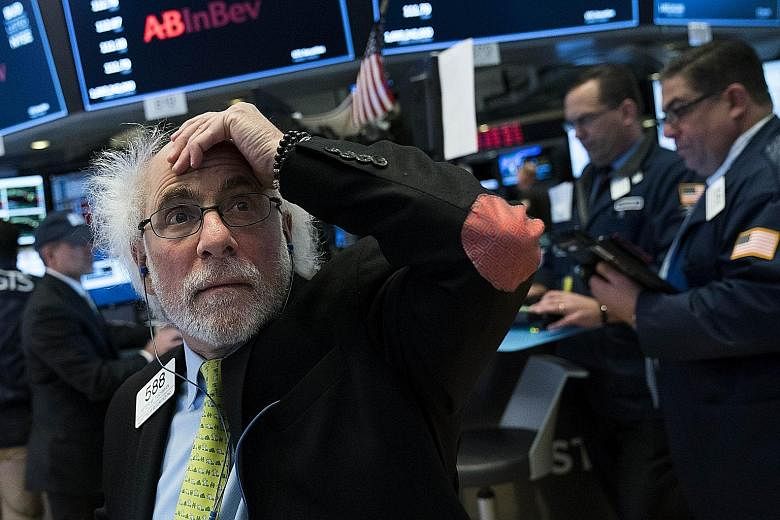NEW YORK • For much of the last year, the stock market in the United States had glided higher, lifted by solid economic growth and corporate profits, low interest rates and few signs of inflation.
That smooth ride might now be ending. The Dow Jones Industrial Average tumbled more than 660 points last Friday, or about 2.5 per cent - its worst day since June 2016.
The Standard & Poor's 500-stock index fell 2.1 per cent, also ending its worst week in two years.
There was nowhere to hide on the stock market, with all 11 S&P 500 sectors lower. The tech-heavy Nasdaq fell 1.96 per cent to its lowest level in two weeks.
The catalyst for last Friday's fall appeared to be a government report that showed the strong United States economy might finally be translating into rising wages for American workers.
While rising pay is good for workers, it can also be a sign that inflation is coming. Investors are worried it could prompt the Federal Reserve to raise interest rates faster than expected.
That is unnerving for investors accustomed to the last decade's rock-bottom interest rates.
"It's a legitimate concern, when inflation spikes up a little bit, that people should evaluate how is this going to affect profits and how is this going to affect the Fed," said Mr Jonathan Golub, chief US equity strategist at Credit Suisse.
"The market is becoming more vigilant about these concerns, and that's good and healthy."
Some were ascribing the market decline to nervousness over special counsel Robert Mueller's probe into whether there was collusion between Mr Donald Trump's presidential campaign and Russia, and reports about a sensitive memo.
However, even after last week's sell-off, stock markets remain at historic highs. The S&P is still 22 per cent above where it was a year ago.
Last Friday's job report showed that average hourly earnings rose 2.9 per cent in January from a year earlier, the fastest growth in years.
But even before the news, other financial indicators were moving in ways that suggested the end to a prolonged period of eerily calm, happy markets was in sight .
The yield on the 10-year Treasury note - a widely used gauge for overall interest rates - rose to more than 2.8 per cent, the highest level since early 2014.
Rising rates have myriad consequences, including making it more expensive for companies and individuals to borrow money.
"People are finally starting to reprice reflation, it's about time," said Ms Jeanne Asseraf-Bitton, head of global cross-asset research at Lyxor Asset Management.
"Global economic growth is strong and corporate earnings are very solid, so there's no reason to question the equity bull market.
"The rise in bond yields is good, it's just the speed at which it's happening that is making investors nervous. Bottom line: This is a healthy correction."
Bitcoin, meanwhile, whipsawed investors, falling below US$8,000 for the first time since November before recovering most of last Friday's losses, as a miserable 2018 continued for cryptocurrencies.
Since reaching a record high of US$19,511 on Dec 18, bitcoin has wiped out more than half its value amid waves of negative news.
NYTIMES, BLOOMBERG, WASHINGTON POST

